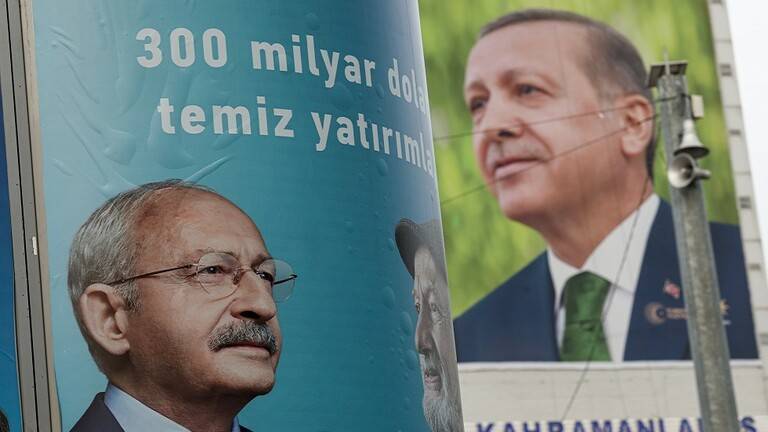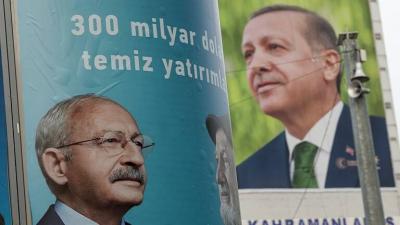Presidential and parliamentary elections in Turkey are scheduled for May 14, 2023, with a second round of presidential elections set for May 28, if no candidate secures 50% of the votes. Turkish President Recep Tayyip Erdoğan faces opposition contender Kemal Kılıçdaroğlu in a pivotal election that puts Erdoğan's 20 years in power at stake. Polls indicate that the competition is very close, potentially necessitating a runoff two weeks after the initial vote.
The 2023 elections are crucial, as a victory for the opposition could restore the secularist movement in Turkey and shift the political system from a presidential to a parliamentary one, reminiscent of the period before the Justice and Development Party (AKP) came to power. Externally, if the opposition wins, there will be a reevaluation of many relationships and stances, such as those with Syria, Russia, and Egypt, aiming for a more balanced approach compared to Erdoğan's current foreign policy. The opposition pledges first to correct relations with Russia, making them more equitable instead of aligning closely with it as Turkey currently does. Second, it aims to reactivate ties with the European Union, from which Turkey has distanced itself significantly in recent years. Third, it does not wish to clash with NATO leadership as occurred recently. Fourth, it aims to engage with Syrian leadership, withdraw from northern Syria, and repatriate refugees within two years while restoring bilateral relations. Fifth, it plans to reestablish secularism in foreign policy and maintain a neutral stance in international disputes. This approach is said to have "significant and profound implications domestically and internationally," as outlined by Turkish affairs expert Mohamed Nour din.
The AKP, led by Erdoğan, considers the Nationalist Movement Party (MHP) as its main ally. Conversely, Reuters reports that the opposition alliance, including the secular Republican People's Party (CHP) and five other parties, is expected to gain support from the pro-Kurdish Peoples' Democratic Party (HDP), strengthening its position in some polls. The presidential race includes Erdoğan as the ruling coalition's candidate, Kılıçdaroğlu as the opposition Nation Alliance candidate, and Sinan Oğan representing the nationalist ATA Alliance. Candidate Muharrem İnce announced his withdrawal from the presidential race, citing the release of compromising images and videos by his opponents. İnce urged Turkish voters to "vote for his party, the Homeland Party, to enter parliament," stating that his withdrawal was due to "fabricated pornography videos and forged corruption files."
This withdrawal comes against the backdrop of polls indicating that neither the ruling coalition ("People's Alliance") led by the AKP nor the opposition alliance is expected to secure a parliamentary majority, similar to the uncertainty surrounding the first presidential election round. Thus, the battle is intense, fierce, and tumultuous, with predictions being sensitive and unresolved due to the narrow margin between the candidates. Although the opposition hopes for its candidate to win, the final word rests with the ballots. One poll suggests that half of the votes that would have gone to İnce will instead go to Kılıçdaroğlu, while about 25% of them will favor Erdoğan. "If these figures are accurate, it will benefit the opposition candidate without guaranteeing a definitive outcome for the opposition as the competition is fierce and the numbers will be very close, possibly leading to a second round, which may yield surprises," Nour din noted, asserting that "the election results will differ by a point or half a point. The chances are equal between the candidates, and small details will play a role."
For the first time, the opposition's chances have increased in these presidential and parliamentary elections, owing to the alignment of the largest opposition parties against the People's Alliance, in addition to the Nation Alliance's efforts to include the pro-Kurdish HDP, which is the third largest party in parliament.
During his first ten years in power, Erdoğan and the AKP maintained their voter base primarily composed of low-income and conservative Turks through strong economic growth. However, the cost-of-living crisis triggered by Erdoğan's unorthodox economic policies over the past year and a half has eroded his popularity, leading him to face the most significant electoral challenge in his 20 years in power.
Hürriyet reported that "İnce's withdrawal from the presidential race will not aid the sole opposition candidate Kılıçdaroğlu, as polls indicate President Erdoğan will win the first round," noting that "according to polls, Erdoğan has surpassed 50% and the election will conclude in the first round with Erdoğan's victory." Kılıçdaroğlu, Erdoğan's main rival, accused Russia of spreading false content on social media before the Sunday vote, without specifying the content. Some polls show a slight lead for Kılıçdaroğlu over Erdoğan.
Kılıçdaroğlu stated on Twitter in both Turkish and Russian, "If you want our friendship to continue after May 15, keep your hands off the Turkish state. We still prefer cooperation and friendship." The Kremlin vehemently denied this. It is worth noting that Moscow and Ankara have close ties, as Russia is Turkey's largest energy supplier, and Russian President Vladimir Putin frequently discusses various issues, including energy and conflicts in Ukraine and Syria, with Erdoğan.
During the heated election campaign leading up to the vote, political figures from both Erdoğan's and Kılıçdaroğlu’s camps complained about online accusations, including the dissemination of videos and photos.
**About Erdoğan and Kılıçdaroğlu:**
- **President Erdoğan:** Erdoğan (69 years old) came to power 20 years ago as Turkey was emerging from a period of severe inflation, promising a competent government to replace the coalition accused of mismanagement. At the peak of Erdoğan's success, Turkey enjoyed prolonged economic prosperity, raising the living standards of its 85 million citizens. Erdoğan, the longest-serving leader in Turkey, has won more than ten elections and survived a coup attempt in 2016, charting a course for the country within his vision of a religious and conservative society influential on a regional level, although critics accuse him of using the judiciary to suppress opposition. In the election campaign, Erdoğan seeks to attract voters by promoting massive infrastructure projects, showcasing Turkey's industrial achievements, and warning of governmental chaos if the opposition wins.
- **Republican People's Party Leader Kılıçdaroğlu:** Kılıçdaroğlu (74 years old) chose an opposition alliance consisting of six parties. He has been unable to close the gap between his party and the AKP in elections since leading the CHP, a center-left party, in 2010. A former civil servant, Kılıçdaroğlu secured a parliamentary seat in 2002 as part of the CHP. He has promised economic prosperity, greater respect for human rights, and the rule of law.




